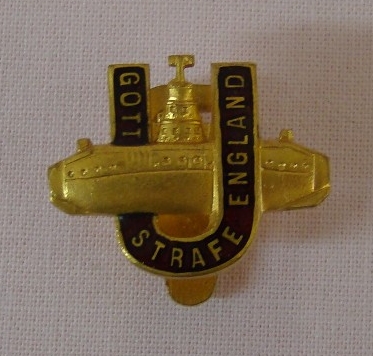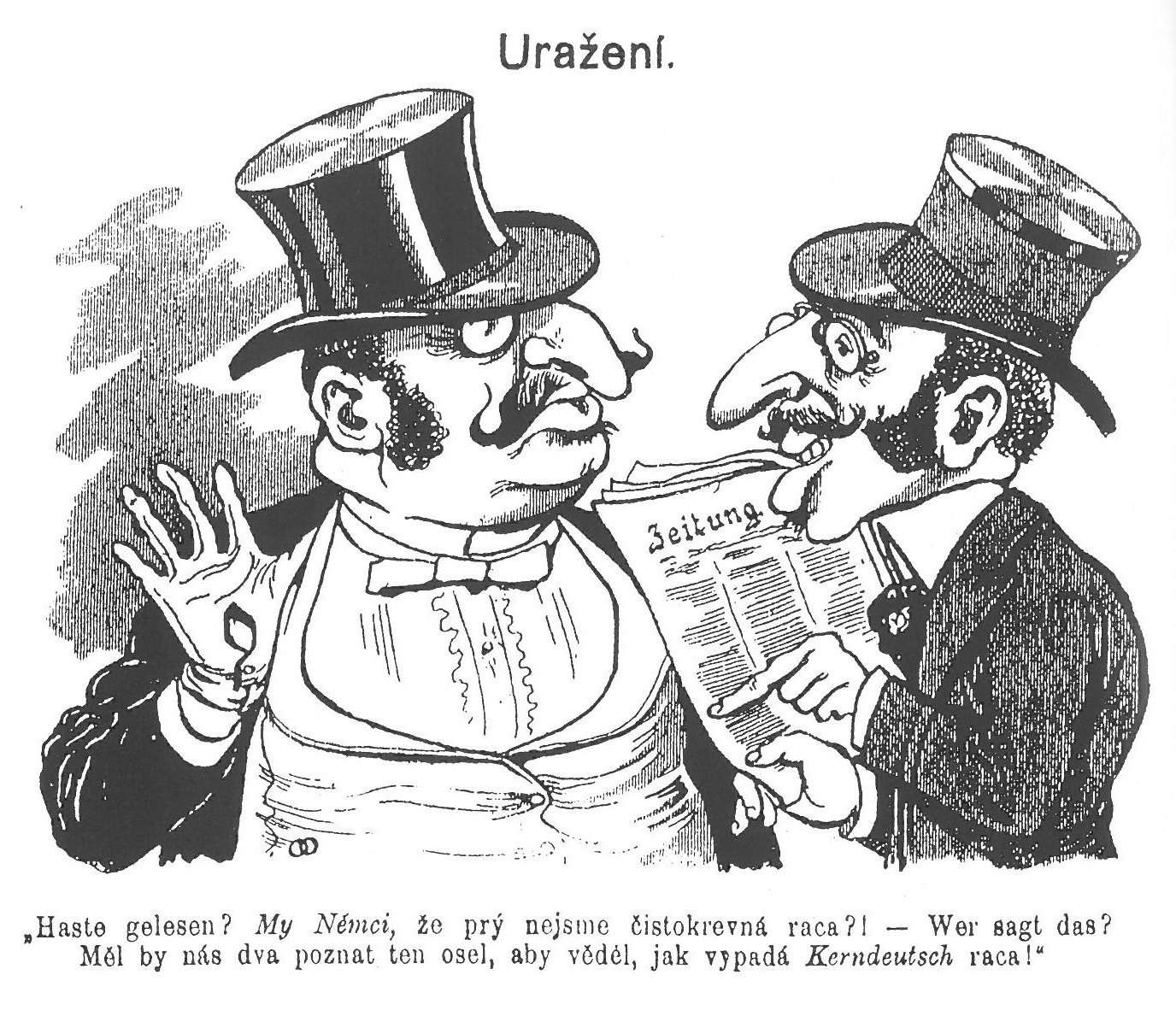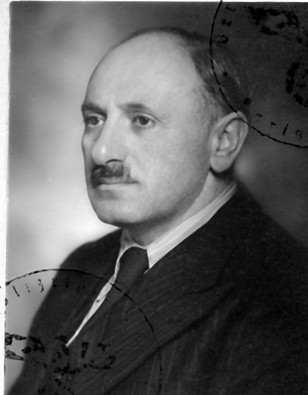More German than the Germans on:
[Wikipedia]
[Google]
[Amazon]
The assimilated Jewish community in Germany, prior to World War II, has been self-described as "more German than the Germans". Originally, the comment was a "common sneer aimed at people" who had "thrown off the faith of their forefathers and adopted the garb of their  The quote is sometimes ascribed to
The quote is sometimes ascribed to

 Kurt Singer (born 1885, died 1944 in
Kurt Singer (born 1885, died 1944 in
The World of Yesterday
'. Translation first published 1943; original German: ''Die Welt von Gestern'' (1941). Lincoln: University of Nebraska Press. p. 231. He was ultimately forced into self-exile in Austria with the Nazis coming into power in 1933, and in 1936 he wrote about himself: "To the Germans I am a Jew masked as a German; to the Jew a German faithless to Israel."
Fatherland
A homeland is a place where a cultural, national, or racial identity has formed. The definition can also mean simply one's country of birth. When used as a proper noun, the Homeland, as well as its equivalents in other languages, often has ethn ...
". The German assimilation, following the Enlightenment
The Age of Enlightenment or the Enlightenment; german: Aufklärung, "Enlightenment"; it, L'Illuminismo, "Enlightenment"; pl, Oświecenie, "Enlightenment"; pt, Iluminismo, "Enlightenment"; es, La Ilustración, "Enlightenment" was an intel ...
, was "unprecedented".
Chaim Weizmann
Chaim Azriel Weizmann ( he, חיים עזריאל ויצמן ', russian: Хаим Евзорович Вейцман, ''Khaim Evzorovich Veytsman''; 27 November 1874 – 9 November 1952) was a Russian-born biochemist, Zionist leader and Israel ...
.
Background
Following the Enlightenment, manyEuropean Jews
The history of the Jews in Europe spans a period of over two thousand years. Some Jews, a Judaean tribe from the Levant, Natural History 102:11 (November 1993): 12–19. migrated to Europe just before the rise of the Roman Empire. A notable e ...
regarded Germany as a particularly desirable place to live, "a place of refuge, in comparison to Russia
Russia (, , ), or the Russian Federation, is a transcontinental country spanning Eastern Europe and Northern Asia. It is the largest country in the world, with its internationally recognised territory covering , and encompassing one-ei ...
and Romania" where antisemitism was extremely virulent and violent, and even France, where the Enlightenment had begun. German Jews began to immerse themselves in German culture and the arts, playing a full and even leading role in society. By the twentieth century, the German Jews had reached a state of ''Bildung und Besitz'' (i.e., cultivation and wealth).

Forming a German-Jewish identity
Jewish women played a major role in the process of forming German-Jewish identity. Since they understood that Jews can hold both Jewish and national identities, Jewish women raised loyal families to Germany in theImperial era
The Roman Empire ( la, Imperium Romanum ; grc-gre, Βασιλεία τῶν Ῥωμαίων, Basileía tôn Rhōmaíōn) was the post- Republican period of ancient Rome. As a polity, it included large territorial holdings around the Medite ...
. They served as mediators of ''Bildung'' within their homes and families, while simultaneously serving as agents of tradition. Many Jewish women continued to keep kosher homes, attend synagogue on the Sabbath
In Abrahamic religions, the Sabbath () or Shabbat (from Hebrew ) is a day set aside for rest and worship. According to the Book of Exodus, the Sabbath is a day of rest on the seventh day, commanded by God to be kept as a holy day of rest, as ...
, and perform other Jewish rituals. In this light, Jews could be regular men and women on the streets and Jews in their homes, as suggested by Enlightenment advocator Yehuda Leib Gordon.
Furthermore, Jewish women were instrumental in forming the social positions of Jews and their sense of "Germanness." They encouraged their children to acculturate through their dress, speech and education and appreciated German entertainment and literature. Jewish women sent their children to music lessons and advanced secular schools. Thus, by combining German bourgeois practice and Jewish heritage, they formed a German-Jewish identity that balanced integration and tradition. Jewish women helped their families look, act, and feel like other Germans while remaining Jewish. Their actions allowed Jews to ultimately receive the description of being "more German than the Germans."
Examples
 Kurt Singer (born 1885, died 1944 in
Kurt Singer (born 1885, died 1944 in Theresienstadt concentration camp
Theresienstadt Ghetto was established by the SS during World War II in the fortress town of Terezín, in the Protectorate of Bohemia and Moravia ( German-occupied Czechoslovakia). Theresienstadt served as a waystation to the extermination ca ...
), was a conductor, musician, musicologist, and neurologist. He was described by his daughter as "more German than the Germans", as he earned an Iron Cross
The Iron Cross (german: link=no, Eisernes Kreuz, , abbreviated EK) was a military decoration in the Kingdom of Prussia, and later in the German Empire (1871–1918) and Nazi Germany (1933–1945). King Frederick William III of Prussia es ...
for his gallantry in World War I, was music editor for a Berlin newspaper, and published research on German folk Lieder, Richard Wagner
Wilhelm Richard Wagner ( ; ; 22 May 181313 February 1883) was a German composer, theatre director, polemicist, and conductor who is chiefly known for his operas (or, as some of his mature works were later known, "music dramas"). Unlike most op ...
and Anton Bruckner
Josef Anton Bruckner (; 4 September 182411 October 1896) was an Austrian composer, organist, and music theorist best known for his symphonies, masses, Te Deum and motets. The first are considered emblematic of the final stage of Austro-Ger ...
.
British scholar Nikolaus Pevsner
Sir Nikolaus Bernhard Leon Pevsner (30 January 1902 – 18 August 1983) was a German-British art historian and architectural historian best known for his monumental 46-volume series of county-by-county guides, '' The Buildings of England'' ...
was described as "more German than the Germans" for his support of Goebbels
Paul Joseph Goebbels (; 29 October 1897 – 1 May 1945) was a German Nazi politician who was the ''Gauleiter'' (district leader) of Berlin, chief propagandist for the Nazi Party, and then Reich Minister of Propaganda from 1933 to 19 ...
' drive for "pure non-decadent German art" and was reported as saying, of the Nazis
Nazism ( ; german: Nazismus), the common name in English for National Socialism (german: Nationalsozialismus, ), is the far-right totalitarian political ideology and practices associated with Adolf Hitler and the Nazi Party (NSDAP) in N ...
in 1933, "I want this movement to succeed. There is no alternative but chaos ... there are things worse than Hitlerism
Nazism ( ; german: Nazismus), the common name in English for National Socialism (german: Nationalsozialismus, ), is the far-right totalitarian political ideology and practices associated with Adolf Hitler and the Nazi Party (NSDAP) in Naz ...
".
German Jew Betty Lipton described German-Jewish identity after emancipation
Emancipation generally means to free a person from a previous restraint or legal disability. More broadly, it is also used for efforts to procure economic and social rights, political rights or equality, often for a specifically disenfranch ...
in "At Home in Berlin." She wrote that her family kept a kosher
(also or , ) is a set of dietary laws dealing with the foods that Jewish people are permitted to eat and how those foods must be prepared according to Jewish law. Food that may be consumed is deemed kosher ( in English, yi, כּשר), fro ...
home, attended synagogue, and was a part of Berlin's tight-knit Jewish community. Simultaneously, her family was loyal to Germany. In 1914, they displayed the largest black, white, and red flag on their whole street. This short account portrays why Jewish families were often described as "more German than the Germans."
Julius Hirsch
Julius Hirsch (7 April 1892 – declared dead 8 May 1945) was a Jewish German Olympian international footballer who was murdered by the Nazis in Auschwitz concentration camp during the Holocaust. He helped Karlsruher FV win the 1910 German fo ...
, who was convinced the Nazis would not harm him as he had fought valiantly in the Imperial German Army
The Imperial German Army (1871–1919), officially referred to as the German Army (german: Deutsches Heer), was the unified ground and air force of the German Empire. It was established in 1871 with the political unification of Germany under the l ...
for 4 years (for which he had been awarded the Iron Cross
The Iron Cross (german: link=no, Eisernes Kreuz, , abbreviated EK) was a military decoration in the Kingdom of Prussia, and later in the German Empire (1871–1918) and Nazi Germany (1933–1945). King Frederick William III of Prussia es ...
) and had played for the German national football team
The Germany national football team (german: link=no, Deutsche Fußballnationalmannschaft) represents Germany in men's international Association football, football and played its first match in 1908. The team is governed by the German Football ...
. He was ultimately proven wrong: the ultimate award for his services to the nation was his deportation to the Auschwitz concentration camp
Auschwitz concentration camp ( (); also or ) was a complex of over 40 concentration and extermination camps operated by Nazi Germany in occupied Poland (in a portion annexed into Germany in 1939) during World War II and the Holocaust. I ...
on 1 March 1943. Although there is no record of his death date, in the absence of any signs of life hereafter, it is assumed he did not survive the war. He had divorced his non-Jewish wife in the hope of saving her and his children from Nazi perseuction, but his half-Jewish children were ultimately also deported to Theresienstadt
Theresienstadt Ghetto was established by the SS during World War II in the fortress town of Terezín, in the Protectorate of Bohemia and Moravia ( German-occupied Czechoslovakia). Theresienstadt served as a waystation to the extermination ca ...
in February 1945; unlike their father they survived the war, as they were liberated by the Allies in May 1945.
Fritz Haber
Fritz Haber (; 9 December 186829 January 1934) was a German chemist who received the Nobel Prize in Chemistry in 1918 for his invention of the Haber–Bosch process, a method used in industry to synthesize ammonia from nitrogen gas and hydroge ...
, a German-Jewish chemist who in 1918 received (together with Carl Bosch
Carl Bosch (; 27 August 1874 – 26 April 1940) was a German chemist and engineer and Nobel Laureate in Chemistry. He was a pioneer in the field of high-pressure industrial chemistry and founder of IG Farben, at one point the world's largest ...
) the Nobel Prize for Chemistry
)
, image = Nobel Prize.png
, alt = A golden medallion with an embossed image of a bearded man facing left in profile. To the left of the man is the text "ALFR•" then "NOBEL", and on the right, the text (smaller) "NAT•" then "M ...
for the invention of the Haber-Bosch process, a key ingredient for the production of modern fertilizer
A fertilizer (American English) or fertiliser (British English; see spelling differences) is any material of natural or synthetic origin that is applied to soil or to plant tissues to supply plant nutrients. Fertilizers may be distinct from ...
s; It is estimated that one-third of annual global food production uses ammonia from the Haber–Bosch process, and that this supports nearly half of the world's population.
However, Haber, a known German nationalist, is also known for his work weaponizing chlorine
Chlorine is a chemical element with the symbol Cl and atomic number 17. The second-lightest of the halogens, it appears between fluorine and bromine in the periodic table and its properties are mostly intermediate between them. Chlorine i ...
, and he lead the team developing gases used for chemical warfare in World War I
The use of toxic chemicals as weapons dates back thousands of years, but the first large scale use of chemical weapons was during World War I. They were primarily used to demoralize, injure, and kill entrenched defenders, against whom the indis ...
.
An upshot of his work however is the invention of Zyklon B
Zyklon B (; translated Cyclone B) was the trade name of a cyanide-based pesticide invented in Germany in the early 1920s. It consisted of hydrogen cyanide (prussic acid), as well as a cautionary eye irritant and one of several adsorbents such ...
, the main gas used in extermination camp
Nazi Germany used six extermination camps (german: Vernichtungslager), also called death camps (), or killing centers (), in Central Europe during World War II to systematically murder over 2.7 million peoplemostly Jewsin the Holocaust. The v ...
gas chambers
A gas chamber is an apparatus for killing humans or other animals with gas, consisting of a sealed chamber into which a poisonous or asphyxiant gas is introduced. Poisonous agents used include hydrogen cyanide and carbon monoxide.
History ...
during the Holocaust
The Holocaust, also known as the Shoah, was the genocide of European Jews during World War II. Between 1941 and 1945, Nazi Germany and its collaborators systematically murdered some six million Jews across German-occupied Europ ...
.
But perhaps the literary epitome of this trope would be Ernst Lissauer
Ernst Lissauer (16 December 1882 in Berlin – 10 December 1937 in Vienna) was a German-Jewish poet and dramatist remembered for the phrase ''Gott strafe England'' ("May God punish England"). He also created the ''Hassgesang gegen England'' ...
, a German-Jewish poet and dramatist who is most remembered for the anti-British slogan ''Gott strafe England
"''Gott strafe England''" was an anti-British slogan used by the German Army during World War I. The phrase literally means "May God punish England". It was created by the German-Jewish poet Ernst Lissauer (1882–1937), who also wrote the poe ...
'' (= may God punish England) during World War I
World War I (28 July 1914 11 November 1918), often abbreviated as WWI, was List of wars and anthropogenic disasters by death toll, one of the deadliest global conflicts in history. Belligerents included much of Europe, the Russian Empire, ...
. He also wrote the poem ''Hassgesang gegen England'' (lit. "Hate song against England", better known as "Hymn of Hate"). Lissauer was described as a passionate German nationalist, with Stefan Zweig
Stefan Zweig (; ; 28 November 1881 – 22 February 1942) was an Austrian novelist, playwright, journalist, and biographer. At the height of his literary career, in the 1920s and 1930s, he was one of the most widely translated and popular write ...
penning that "Germany was his world and the more Germanic anything was, the more it delighted him."Zweig, Stefan (1964). The World of Yesterday
'. Translation first published 1943; original German: ''Die Welt von Gestern'' (1941). Lincoln: University of Nebraska Press. p. 231. He was ultimately forced into self-exile in Austria with the Nazis coming into power in 1933, and in 1936 he wrote about himself: "To the Germans I am a Jew masked as a German; to the Jew a German faithless to Israel."
See also
*Jewish assimilation
Jewish assimilation ( he, התבוללות, ''hitbolelut'') refers either to the gradual cultural assimilation and social integration of Jews in their surrounding culture or to an ideological program in the age of emancipation promoting conf ...
* More Irish than the Irish themselves
"More Irish than the Irish themselves" ( ga, Níos Gaelaí ná na Gaeil féin, la, Hiberniores Hibernis ipsis) is a phrase used in Irish historiography to describe a phenomenon of cultural assimilation in late medieval Norman Ireland.
History ...
* The Stab-in-the-back myth
The stab-in-the-back myth (, , ) was an antisemitic conspiracy theory that was widely believed and promulgated in Germany after 1918. It maintained that the Imperial German Army did not lose World War I on the battlefield, but was instead ...
, a contrasting German antisemitic trope.
References
{{Reflist Antisemitism in Germany German culture Jewish German history Germanization